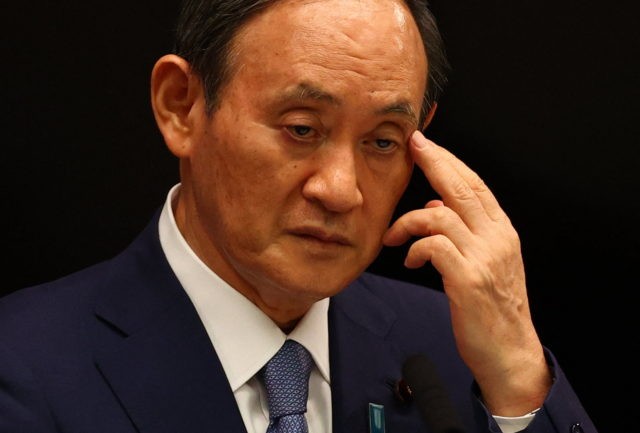Japan’s Asahi Shimbun published a poll Monday that showed support for Prime Minister Suga Yoshihide and his cabinet dipping to an all-time low of 28 percent as the Tokyo Olympics concluded.
Suga’s rating dropped three points since the Olympics began, frustrating his Liberal Democratic Party’s (LDP) hopes that the Olympics would give the party a bounce before the Lower House elections this fall. The election has not been scheduled yet, but must be held before the end of October.
The Olympics themselves were fairly popular in the Asahi Shimbun poll. Respondents agreed with Suga’s decision not to cancel them by 56-32 and Japan won its biggest haul of medals in history. However, poll respondents said by 54-32 percent that the Olympics were not held in a “safe and secure” manner as Suga promised. This is a significant reduction from the 68 percent who worried the Tokyo Olympics might be unsafe before the event began — suggesting some fears were alleviated by the actual results — but not enough to give Suga or the LDP an approval bump.
Only 23 percent said they approved of how Suga’s government has dealt with the pandemic. Sixty-one percent said holding the Olympics led to “complacency” during what should have been a state of total emergency in Tokyo.
Japan went through an explosive surge of coronavirus cases during the Olympics, notching a million cases before the Games concluded, including the Japanese debut of the notorious “Delta variant.”
Suga and his officials contend the Olympics did not cause the surge, noting that infections inside the “Olympic bubble” grew much more slowly than the rest of the country, but this argument did nothing to help the prime minister’s approval ratings.
“Although the Olympics were postponed for a year and held under various restrictions, I believe we were able to fulfill our responsibility as host country. I would like to express my sincere appreciation to the Japanese people for their understanding and cooperation,” Suga said at a press conference Monday.
“Ultimately, the Olympics have had a negative impact on Mr. Suga,” Komazawa University associate professor of political communications Osaka Iwao told Kyodo News on Sunday.
“The fact that the number of novel coronavirus cases surged during the Olympics is a failure for his government politically, as he had envisioned holding the games with the virus under control with vaccines and going into the election, and also in terms of crisis management,” he said.
“It all comes down to the delay in vaccinations. Had Japan been able to start them a month or two earlier, things would have been very different,” Osaka contended. Other analysts quoted by Kyodo News said public trust in Suga and his party has been irreparably damaged by the coronavirus surge.
The LDP is expected to lose seats in the fall, but it might avoid a total bloodbath because the opposition parties score even lower than LDP’s dismal 32 percent approval rating. Osaka predicted Suga would try to hold off the election for as long as possible in the hope that public disapproval for his government will dissipate.
Suga himself appears to face no formidable competitor for party leadership or the prime minister’s post, although many Japanese political handicappers believe Suga could lose either or both positions if the election were held today, given public anger with the coronavirus surge.
The South China Morning Post (SCMP) suspected Suga might cancel the Tokyo Paralympics after a panel of pandemic response experts meets Monday. The Paralympics are currently scheduled to begin August 24.
Japan Association of Infectious Diseases president Tateda Kazuhiro, a member of the expert panel, said Monday the coronavirus situation in Japan is “critical” and “certainly becoming worse.”
“We always said that 4,000 cases a day in Tokyo was going to be a worryingly high figure, in part because it puts so much pressure on the clinical side of the response, but there are some models that predict as many as 10,000 new cases daily in the next two weeks,” he said.
“We will be discussing recommendations that the government issue a stronger message to people about changing their behaviour [sic] to stop the spread of the virus, but if that cannot be done and we see numbers continuing to rise then our recommendation will be for the Paralympics to be cancelled,” he warned.
“We know it is a hard decision for the government. but my personal opinion is that a decision on the Paralympics needs to be taken this week as numbers are still rising and many doctors say the situation they are facing is critical,” Tateda said.

COMMENTS
Please let us know if you're having issues with commenting.